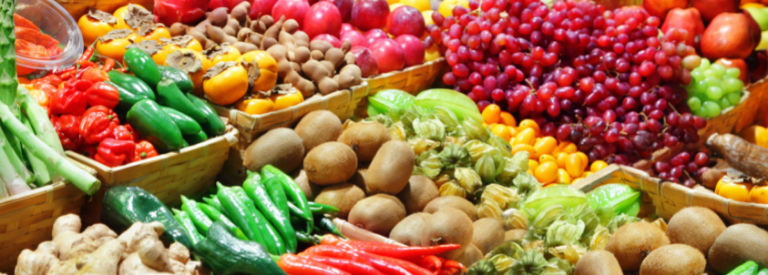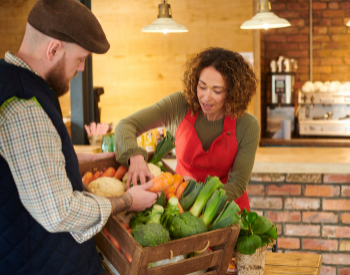Restaurants buying locally grown food is no longer just a trend, many believe it’s here to stay. What started in high-end restaurants has now ingrained itself into the culinary landscape of the United States and other parts of the world. But is sourcing your restaurant’s food from a farmer’s market really all it’s cracked up to be? According to the evidence, the benefits of locally sourced food far outweigh the cons, and here’s why.

Why Should Restaurants Support Local Farmers?
Adding locally sourced ingredients to your dishes increases the quality of your food, customer satisfaction, and finances. This is because food from the farmer’s market has more nutritional value, product variety, and they are possibly safer. On top of that, promoting farmers’ market foods in your restaurant can give you a sales boost due to so many customers being more health-conscious and environmentally friendly. Take advantage of each of the following benefits to stay ahead of the competition.
Increase The Flavors & Nutrition Of Your Dishes
Genetically altering plants is almost as old as farming itself. Farmers have been bioengineering fruits and vegetables, processing them with chemicals to extend their shelf life for storage and transport purposes. While these methods have their advantages, they come at a price. When fruit and vegetables are genetically modified or treated with pesticides, antibiotics, or hormones, they often lose nutrients and flavor.
On the other hand, locally sourced foods are not treated with pesticides because they do not need to travel long distances. This makes them more flavorful and packed full of nutrients. Customers will be able to enjoy meals more when made with freshly picked ingredients. Unfortunately, the lack of pesticides means they spoil quickly, so you’ll have to keep a close eye on them.
Add More Variety To Your Menu
Local vendors offer a larger selection of foods such as heirloom varieties, regionally exclusive products, specially ordered produce, or featured seasonal foods. With all these choices, you’ll be able to add more variety to your menu and give customers a chance to try something they’ve never tasted before.
- Heirloom Varieties - An heirloom variety of a fruit or vegetable is a plant that has been around since before modern agriculture and has not been biologically engineered. Because they are not modified or chemically treated, they have a stronger taste and give your dishes a boost of flavor.
- Regionally Exclusive Foods - At the farmer’s market, there are fruits and vegetables available that are unsuited for large-scale farming and can only be found locally. Depending on where you are located, you might find unique products such as purple cauliflowers, red carrots, or quail eggs.
- Special Orders - Many local farmers are willing to grow special products at the request of customers. This service is especially helpful if there is a particular ingredient you want but cannot find. Farmers will research to see if they can grow your ingredient in their locality and if it affects their other plants. If they are able to grow it, they will allow you to pick it at the specific time you need it.
- Seasonal Foods - Farmers can inform you when certain fruits and vegetables are in season so you can feature those particular ingredients on your menu. Offering seasonal dishes will make your food more enticing to customers and tastier.
 Locally Sourced Food Is Possibly Safer
Locally Sourced Food Is Possibly Safer
The belief that locally sourced food is safer is one of the reasons why many chefs and consumers have joined the farm-to-table movement, but this is not entirely true. While most locally sourced food might not contain preservatives, they are not subject to food safety regulations and inspections mandated by the government. If the farmer or your staff doesn’t properly inspect or handle food carefully, locally sourced food can become contaminated.
To avoid this, get to know your farmer and their practices. Visit them to inspect their farming methods and learn about their values. Make sure plants and animals are safe and clean and check to see if there is any animal waste nearby that can contaminate food. You should also take a look at the way food is being transported. Check vehicles for foul smells, cleanliness, and insects.
Once food has arrived at your establishment, enforce food and safety practices in your kitchen. Instruct staff to properly separate, clean, store, and prepare food. If your food does get contaminated, be sure to have a backup supplier ready and get rid of any harmful ingredients.
What Should You Not Buy At A Farmer’s Market?
While farmer’s markets are great places to find high-quality goods, you must remember that not every item will be as good as it seems. You should watch out for these foods being sold at farmer’s markets and avoid them if possible.
- Raw milk - This type of milk is illegal for human consumption in some states because it is unpasteurized. Pasteurization is the process of killing bacteria such as E.Coli, which can cause food poisoning. While some claim raw milk has more nutrients, it is better to stay away from it unless you completely trust the farmer who is selling it.
- Out-of-season ingredients - When visiting a farmer’s market, it is extremely important to know what is in-season and what’s not. Sometimes farmers will store produce for months and sell it at the market out of season while claiming it’s fresh. Simply keep a list of in-season produce handy to avoid this.
- Meat - No one can deny that grass-fed beef and fresh seafood are delicious. However, if meat is not properly chilled or kept close to different types of meat, there is a higher chance they can carry foodborne pathogens and cross-contamination. Make sure the meat and seafood you select at the farmer’s market are properly chilled, handled, and separated from other raw foods.
Give Your Establishment A Sales Boost
Don’t you want to know where your food comes from? This is exactly how customers feel when they dine out. A growing number of customers have expressed keen interest in locally grown food for several different reasons. When eating at a farm-to-table restaurant, customers know that the food on their plate is fresh, nutritional, and flavorful. Not to mention, your establishment will acquire a reputation for supporting your local community. When picking a place to eat, consumers will favor visiting a business that shares the same values as their own.

Staff Will Easily Upsell Menu Items
By teaching your staff about where ingredients come from, they’ll acquire a deeper appreciation for your food items and have an easier time upselling and answering questions customers may have. Some farmers are willing to visit restaurants to talk about the process of growing produce and the factors that contribute to a small harvest. Alternatively, your staff can visit local farmers to see how produce is grown. It doesn’t just have to be your front-of-the-house staff either. Your back-of-the-house staff, such as your cooks and kitchen managers can also learn more about ingredients and talk with farmers on how to better prepare them.
Help The Environment
Not only is supporting local farmers financially beneficial, but it’s also great for the environment. Local farms don’t use as much energy as large farms because they don’t have to transport food over long distances. Transporting food uses a great number of natural resources, pollutes the earth, and produces trash from the amount of packaging involved. The agricultural byproducts of commercial agriculture can also pollute the environment if it seeps into water. In contrast, most local farmers use organic methods to grow food which means they don’t need to use chemicals that are harmful to the environment.
Tips For Picking A Farmer
Before heading over to the farmer’s market, follow these tips when scouting for a potential farmer you want to do business with.
- Look up a growing calendar online to learn about what plants are in season in your area. Different parts of the country have different growing seasons, which will affect what is available in the market.
- Check food for quality and try samples from different vendors.
- See which vendors offer the most variety.
- Talk with farmers and ask them questions about their farming practices.
- Ask if they offer services, such as urgent weather updates or pest problem warnings.
- Ask if they are willing to visit your establishment to educate staff or if staff can visit the farm to learn more about growing ingredients.
- See if they offer delivery directly to your establishment.
- Keep pricing in mind, select a farmer with rates you can afford.






